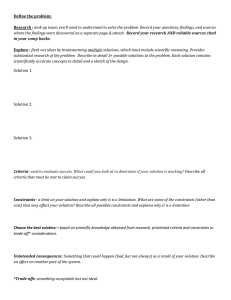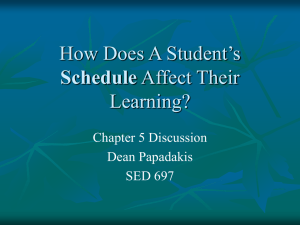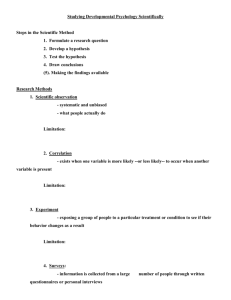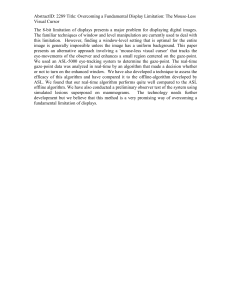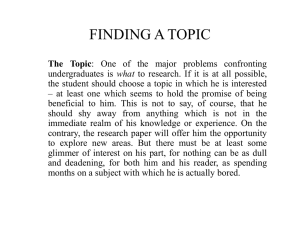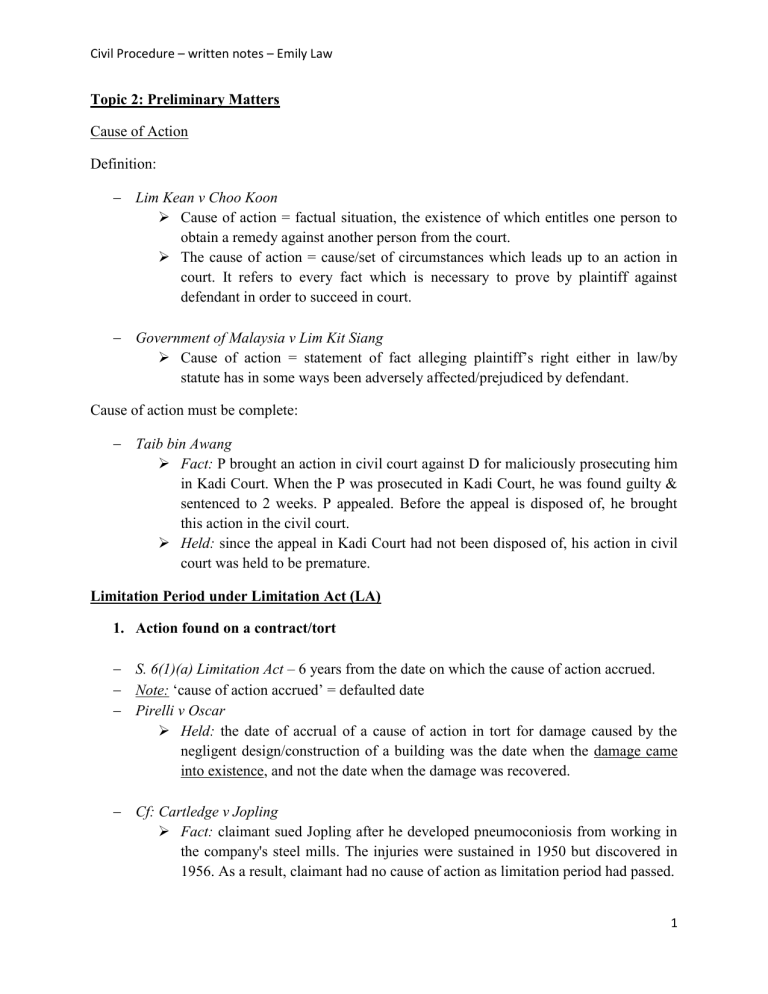
Civil Procedure – written notes – Emily Law Topic 2: Preliminary Matters Cause of Action Definition: Lim Kean v Choo Koon Cause of action = factual situation, the existence of which entitles one person to obtain a remedy against another person from the court. The cause of action = cause/set of circumstances which leads up to an action in court. It refers to every fact which is necessary to prove by plaintiff against defendant in order to succeed in court. Government of Malaysia v Lim Kit Siang Cause of action = statement of fact alleging plaintiff’s right either in law/by statute has in some ways been adversely affected/prejudiced by defendant. Cause of action must be complete: Taib bin Awang Fact: P brought an action in civil court against D for maliciously prosecuting him in Kadi Court. When the P was prosecuted in Kadi Court, he was found guilty & sentenced to 2 weeks. P appealed. Before the appeal is disposed of, he brought this action in the civil court. Held: since the appeal in Kadi Court had not been disposed of, his action in civil court was held to be premature. Limitation Period under Limitation Act (LA) 1. Action found on a contract/tort S. 6(1)(a) Limitation Act – 6 years from the date on which the cause of action accrued. Note: ‘cause of action accrued’ = defaulted date Pirelli v Oscar Held: the date of accrual of a cause of action in tort for damage caused by the negligent design/construction of a building was the date when the damage came into existence, and not the date when the damage was recovered. Cf: Cartledge v Jopling Fact: claimant sued Jopling after he developed pneumoconiosis from working in the company's steel mills. The injuries were sustained in 1950 but discovered in 1956. As a result, claimant had no cause of action as limitation period had passed. 1 Civil Procedure – written notes – Emily Law Issue: whether the time began to run from the date when something happened but does no harm or the date when the harm is done. Held: A cause of action does not accrue until the person discovered the injury. A man has suffered no injury if he does not feel any symptom/have any knowledge of his disease. Note: Malaysia follows Pirelli’s case Credit Corp (M) Bhd Held: o It is established that the cause of action normally accrued when there is in existent a person who can sue & another who can be sued & all the facts have happened which are material to be proved to entitle P to succeed o This limitation law is to discourage P from sleeping on their action. More importantly, to have a definite end to litigation. 2. Action upon judgement Note: only applicable when there is already a judgement from the court S. 6(3) LA – a) For an action upon judgement: 12 years from the date on which the judgement become enforceable b) To claim arrears of interest: 6 years from the date the interest became due. 3. Action to recover land S. 9(1) LA – 12 years from the date which the right of action accrued. Nasri v Mesah Action to recover land includes: a) action for possession (paid but seller refuses to give up possession) b) ownership (paid but seller did not transfer ownership) c) specific performance (vendor sold land but then refuses to proceed) In the case action founded in contract, time runs from breach. 4. Action to recover principal sum secured by a charge/to enforce charge Note: only applicable to security S. 21(1) LA – 12 years from the date when the right to receive money accrued. Tan Kong Min Fact: A land was sold in an auction. A contended that R’s claim for the balance after sale is a claim founded on contract and therefore subject to the limitation 2 Civil Procedure – written notes – Emily Law period of 6 years under s. 6(1)(a) of LA. R contended that the claim is a claim for money secured by a charge on land & therefore, subject to the limitation period of 12 years under s. 21(1). Held: o The applicable provision is s. 21(1), specifically refers to an action to recover money secured by a charge. o Therefore, the limitation period = 12 years from the date the right to receive money accrued / the right to foreclose accrued. 5. Fraudulent breach of trust S. 22(1) LA – no limitation period to an action by a beneficiary under a trust in an action: a) There is fraudulent breach of trust (fraud) b) Trustee was a party (privy) c) To recover the trust property/proceed from trustee in the possession of trustee/converted to his use (recover) 6. Action based on breach of trust other than stated in s. 22(1) S. 22(2) LA – 6 years from the date on which the right of action accrued. 7. Action in the claim to the personal estate, share or interest of a deceased person Note: applicable to both estate with will/intestacy (die without will) S. 23 LA – a) To claim personal estate: 12 years from the date when the right to receive the share/interest accrued. b) To claim legacy (gift) /damages: 6 years from the date the interest became due. 8. Set-off & counterclaim S. 31 LA – any claim of set-off/counterclaim shall be deemed to be a separate action & to have been commenced on the date the action to set-off/counterclaim is pleaded. Limitation Period under Public Authorities Protection Act (PAPA) Note: only applicable to government servants S. 2(a) PAPA – 36 months after the act, neglect or default Government of Malaysia v Lee Hock Ning Fact: R claimed the payment of money due under the contract entered into between him & A (Government of Malaysia) to build primary school. At the trial, A pleaded s. 2 of PAPA & the trial judge held that R’s claim was time barred. 3 Civil Procedure – written notes – Emily Law Held: the right of R was correlated with the obligation entered into under the contract. Accordingly, the claim was not time barred. Phua Chin Chew Fact: P = teacher who became mental disordered. He submitted a letter of resignation & was accepted by the government. However, his service was terminated. (recognition is different from termination) P’s brothers set up a committee to sue the government in 1982 & the suit was filed in 1983. Later, P recovered. Held: o In the case of disability (insane person), there are 2 situations: a) If he chooses to bring an action himself, the limitation period starts from the date when the person ceased to be under disability b) If a committee is appointed to manage his affairs, time begins to run from the date the committee is set up but not from the date of the letter of resignation/termination. o Therefore, the action was not time barred as the committee was appointed in 1982 and the suit was filed by the committee in 1983, it was instituted well within time. Limitation Period under Civil Law Act (CLA) 1. Dependency claim S. 7(5) – to claim within 3 years after the death of deceased person. Kuan Hip Peng Fact: the writ was issued 4 days after the 3 years period prescribed in s. 7(5) CLA Held: o Provision under s. 7(5) CLA is absolute & contains no exception. The writ was struck out. o Further, s. 24(1) of LA does not apply to dependency claim. 2. Action against the estate of deceased tortfeasor S. 8(3) CLA – 6 months after his personal representative took out the representation (letter of administration) Eg: X died in an accident. The bank want to sue for debt owed by X. the bank can sue X’s next-to-kin who holds the deceased’s estate/property. Kuan Hip Peng – The court has no power to enlarge the time under CLA. 4 Civil Procedure – written notes – Emily Law Lee Lee Cheng Fact: P, as administrator of the deceased’s estate took out the representation in 1957 & instituted an action in 1958 to claim for damages for the wrongful death of deceased. Held: o Under s. 8(3) of Civil Law Ordinance, the proceeding must commence within 6 months after the PR took out the representation. The action was time barred. o The High Court does not have any inherent power to dispense (grant an exemption) in the provisions of limitation. Extension of Limitation Period S. 24(1) LA – action may be brought at any time before the expiration of 6 years from the date when such person ceased to be under disability/died, whichever occurred first, notwithstanding that the limitation period had expired. The Act does not define ‘disability’. Phua Chin Chew – Disability exists in 2 circumstances: infant/minor & mental disorder. Note: Kuan Hip Peng – this extension does not apply to dependency claim under s. 7(5) CLA 5
